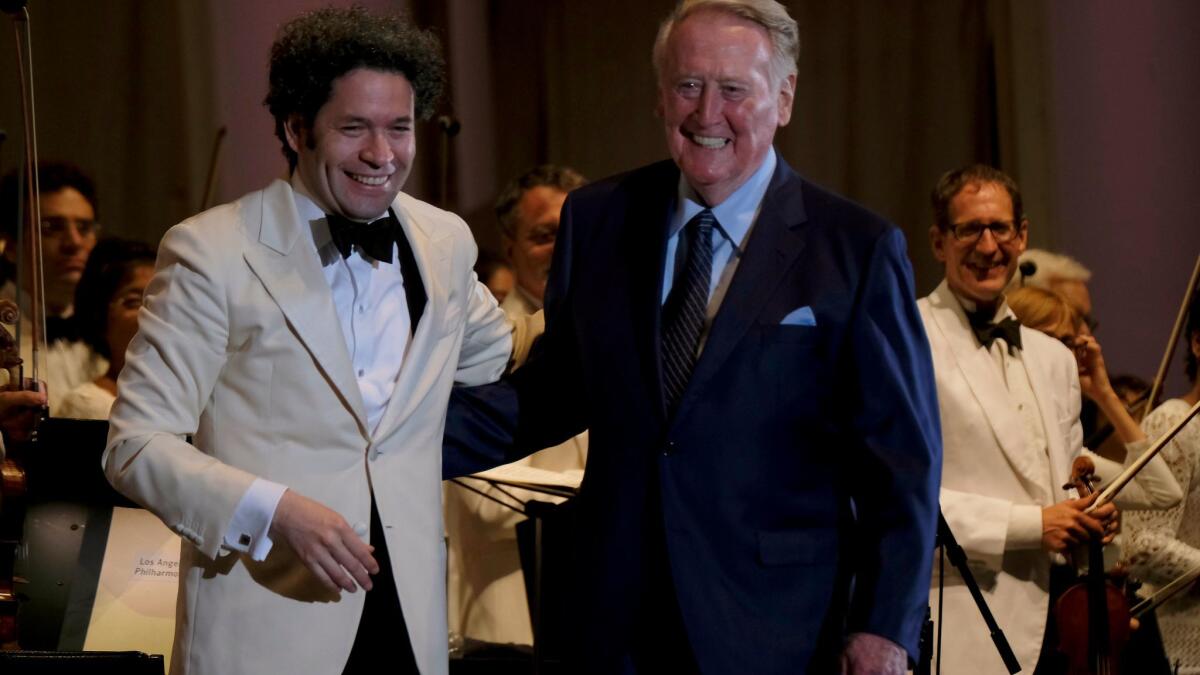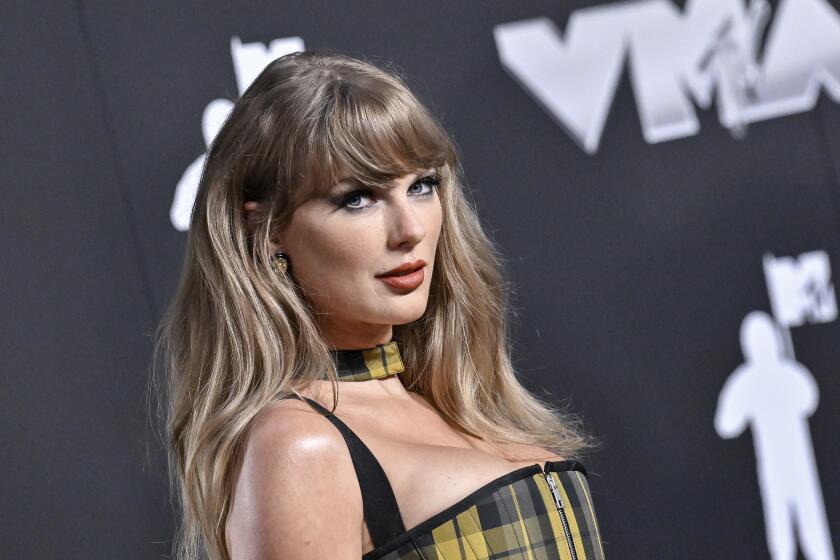Vin Scully on giving voice to Abe Lincoln at the Bowl: ‘One of the most thrilling moments of my life’

Leave it to longtime Dodgers announcer Vin Scully to invoke a baseball metaphor in describing one of his highest-profile public appearances since stepping away from the microphone for the Boys in Blue at the end of last season.
On Thursday he joined the Los Angeles Philharmonic and Music Director Gustavo Dudamel in the first of two performances at the Hollywood Bowl. As he will again do on Tuesday, Scully narrated powerful words from the nation’s 16th president that composer Aaron Copland incorporated into his 1942 work “Lincoln Portrait.”
The jump from the baseball broadcast booth to the classical music stage gave the 89-year-old Hall of Famer pause when the invitation from L.A. Phil officials arrived.
See the most-read stories in Entertainment this hour »
“They invited me to do it, and my first thought was, ‘Whoa, that’s kind of out of the ballpark for me,’” Scully said Friday.
“Then they listed the various people who have been honored to do this piece, and all of a sudden I thought it’s such a great honor I can’t turn it down,” he said. “I just pray that I don’t mess it up.”
Although Scully eloquently spun out millions of words about all facets of the national pastime during his unprecedented 67-year tenure with the Dodgers, dating back before the team moved from Brooklyn to Los Angeles, only now does he join an imposing roster of people who have taken on “Lincoln Portrait”: actors Henry Fonda, Gregory Peck, Katharine Hepburn, Tom Hanks, James Earl Jones, Danny Glover, Melvyn Douglas and Charlton Heston; presidents Bill Clinton and Barack Obama, vice presidents Al Gore and Walter Mondale, Sens. Edward M. Kennedy and George S. McGovern, and British Prime Minister Margaret Thatcher; writers Carl Sandburg and Gore Vidal; musicians William Warfield (whose 1983 recording earned him a spoken world performance Grammy Award), folk-rocker James Taylor and folk singer Odetta; and athletes such as Philadelphia 76ers basketball star Julius Erving and Pittsburgh Pirates veteran first baseman Willie Stargell.
Not surprisingly, a common love for sports provided the initial common ground between Scully and Dudamel.
“He’s a rabid baseball fan,” Scully said. “That was an immediate bridge. The thing that was lucky is that I decided that if he’s relaxed enough, I’m going to ask him for his autograph. So I brought the sheet music that I had studied with me and had a pen for him to sign it.
“As soon as we shook hands, I said ‘Would you sign my copy of the score?’ At that moment he pulled a copy of the score with his notes from behind his back and asked me to sign his copy,” Scully said. “We just hit it off immediately, and it was because of him that it worked.”
On Friday, Dudamel tweeted a note about the performance along with several photos, including a shot of the cover of his copy of the Copland score, with Scully’s inscription: “To Gustavo--With great respect + admiration, Vin Scully.”
I thought it’s such a great honor I can’t turn it down. I just pray that I don’t mess it up.
— Vin Scully on performing with the Los Angeles Philharmonic
Scully didn’t consider the whole enterprise a home run even as the first performance approached.
“About two days before the first and only rehearsal, I did have thoughts of, ‘What have I gotten myself into?’ Really and truly, my life has been wonderful, and I’ve always believed that everything that’s happened to me has been God-given — I never felt that I deserved it,” he said. “And I started to think, ‘Am I pressing things? Am I going to do something I’m not equipped to do?’ I will say Gustavo Dudamel was marvelous. He made me feel so comfortable.”
Far from simply reciting printed text, the narrator is called on to place Lincoln’s words — which Copland pulled from various speeches — in time and in character with the music he composed to frame those sentiments.
Scully said a single rehearsal Thursday morning, a few hours before the evening performance, focused on getting Scully comfortable with watching for Dudamel’s cues on when to move into each section of the narration.
They did not, he said, discuss the emotional tone he should strive for, or how to emphasize, or de-emphasize, particular words or phrases.
“The music really affected me,” he said. “The tone in my voice was affected and dictated by the music. I wasn’t thinking ‘I’ve got to draw this out’ or ‘I need to speed this up.’ I went with the flow. I felt like the music was inside of me, and I was deeply touched.”
Most of the text centers on Lincoln’s thoughts about the Civil War and slavery, which Copland fashioned into his piece written in the midst of World War II.
REVIEW: Music critic Mark Swed on Night 1 of the Scully concert »
Three-quarters of a century after the piece was introduced in 1942 by conductor Andre Kostelanetz, who commissioned it, and the Cincinnati Symphony, Scully noted that it remains a piece that feels both timeless and immediate.
Near the outset of the narrated section, for instance, Copland drew from Lincoln’s message to Congress on Dec. 1, 1862, when the President said: “Fellow citizens, we cannot escape history. We of this Congress and this administration will be remembered in spite of ourselves. …The fiery trial through which we pass will light us down in honor or dishonor to the latest generation. We, even we here, hold the power and bear the responsibility.”
“Immediate indeed,” Scully said. “With the country as divided as it is, this was a call for unity. I only had the difficulty of reacting. It just had me from the moment it begins.”
The biggest challenge for Scully may have been the prelude to his part in the piece, given that the narration begins after several minutes of orchestral music.
“You’re just standing there, waiting,” he said. “I think the wait is close to nine minutes and you just stand there while the music is playing. The orchestra is behind you, and it’s like a gigantic tidal wave. It fills you and whisks you away. I was overwhelmed with that feeling. I told my wife, ‘That was one of the most thrilling moments of my life.’ My feeling was I was an amateur amongst Hall of Famers.”
During that instrumental portion, he added, “all kinds of thoughts are going through your mind: Don’t mess up. Pay attention. And oh my gosh, the music. Your head is really whirling. But once Gustavo started me off, I was just swept along with the music and the words. I wouldn’t say I would have cried, but I was glad I didn’t.
“I just tried to stay within myself,” he said. “I didn’t want to start bawling, but I could feel the music and how it builds to the war; the drums sound like cannons; his words that we are going to be judged and what he thought of democracy, the way the music played — I’ve got goosebumps right now just talking about it.”
At Thursday’s performance, an ovation erupted before the piece ended, following the final line of the text, when Scully recited Lincoln’s vow from the battlefield at Gettsyburg “that government of the people, by the people and for the people shall not perish from the earth.”
That was the moment, Scully said, “that brought me back to square one. I guess in one way I was in my own world, reading and listening to the music. I forgot there was an audience.”
The performance was recorded and is scheduled to be broadcast July 30 at 7 p.m. on KUSC-FM (91.5) along with the rest of the program, which opened with Copland’s “Fanfare for the Common Man” and concluded with Beethoven’s Ninth Symphony.
Asked whether he felt any less jittery heading into Tuesday’s final performance now that he had a standing ovation and a curtain call, Scully reverted to a sports analogy one more time.
“In all honesty,” he said, “maybe it was a rookie first-time, first-shot-good. There’s no rehearsal for Tuesday. I’m just going to run through it in my head again and remember that there’s Gustavo to help me.
“In all capital letters,” he said, “HONORED.”
Follow @RandyLewis2 on Twitter.com
For Classic Rock coverage, join us on Facebook
ALSO
In this digital self-help age, just how effective are MasterClass’s A-list celebrity workshops?
‘13 Reasons Why’ is affecting America’s classrooms. Teachers tell us their stories
UPDATES:
July 17, 12:30 p.m.: This post has been updated with a post from Gustavo Dudamel’s Twitter feed showing his score of Copland’s “Lincoln Portrait” bearing Vin Scully’s autograph.
July 18, 9:56 a.m.: Updated with 7 p.m. time of the KUSC-FM broadcast on July 30.
More to Read
The biggest entertainment stories
Get our big stories about Hollywood, film, television, music, arts, culture and more right in your inbox as soon as they publish.
You may occasionally receive promotional content from the Los Angeles Times.








